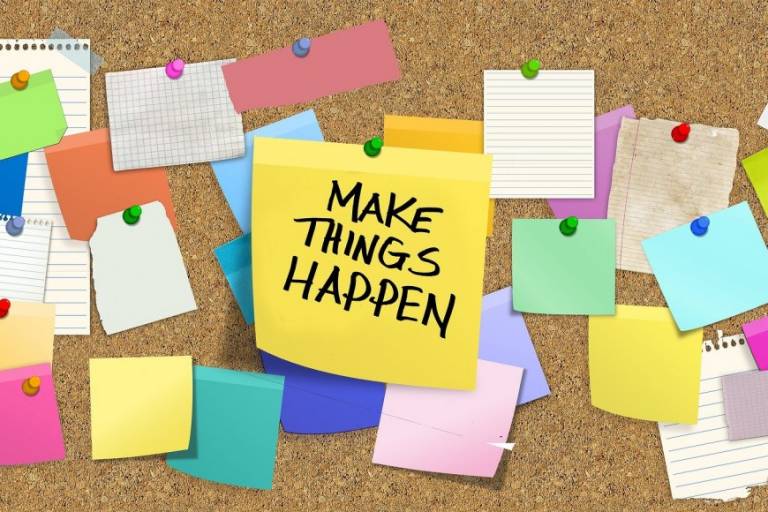Routines provide structure and increase our sense of security. They allow our brain to focus on important tasks by freeing up working memory for more complex endeavours, such as studying. When we need to get things done, routines reduce the number of decisions we have to make, with each one potentially depleting our willpower.
Routines are regular, repeated habits usually described as “when x happens, I respond with y”, such as “on each weekday at nine in the morning, I will sit at my desk, open my computer and start studying.” When you first start creating routines, it is best to tie them to a time and place, like you do with your hobbies. This will help you stick to your routine. Set aside a dedicated time and place for a particular activity.
In his 2018 book Atomic Habits: An Easy & Proven Way to Build Good Habits & Break Bad Ones, James Clear describes four laws of behaviour change that help us build better habits:
- Make it obvious. Make the triggers visible for desired behaviour and invisible for unwanted behaviour. Visible triggers will help you stick to a new habit. For example, when building study habits, you should pack your backpack and place it by the door as well as create a dedicated study space where all the materials and tools you need are in their own place and easily available. It may be a good idea to occasionally try studying in new surroundings, such as a library or a park, where you will not see any cues that trigger unwanted behaviour: it is easier to avoid temptations than to resist them.
- Make it attractive! The dopamine levels in our brain affect the formation of routines and habits. For example, eating junk food, playing video games and browsing social media is associated with higher levels of dopamine in the brain. Dopamine also plays an important role in motivation, learning and memory. Our body releases dopamine not only when we experience pleasurable events but also when we anticipate a reward, which increases our motivation to engage in a specific activity. Try temptation bundling: pair an action you want to do with an action you need to do. For example, if you want to exercise in the spring sunshine but need to study more, try this: after you have studied for a certain period of time (such as an hour), you can go out to exercise.
- Make it easy! Regular practice is the key to building new habits. Start easy. For example, if you want to exercise more, incorporate your new habit (such as walking to work) into the usual course of your day. Choose a gym that is near your home. If you join a gym that is far away, you are more likely to miss your sessions. It is easier to start studying when the tools and materials you need are organised and in place and you have chosen a clear and straightforward assignment as your first task. Try the two-minute rule: when you are starting new habits, downscale them until they can be done in two minutes. You can also try to increase the friction associated with your unwanted habits: when you need to study, put your game console out of sight and either switch off or mute your phone and take it to a different room. This will allow you to minimise distractions and get rid of time thieves.
- Make it satisfying! Habits become automatic through regular repetition. We are more likely to repeat behaviour that is rewarding. Our brains are hard-wired to prioritise instant gratification over long-term rewards. We may have difficulty staying focused while studying, if the reward (such as getting things done, passing an exam, earning credits or completing an essay) comes later. When you practice your new habits, give yourself small instant rewards when you achieve intermediate goals. Still, the most important source of motivation is success. It can also be rewarding to keep track of your routines and cross off days in your calendar or items in your to-do list, as this will help you recognise your achievements and monitor your progress.
Habit formation may not be easy to begin with. Your routines and habits should, for the most part, bring you joy and satisfaction and work for you personally so you can stick to them on a daily basis. Even if we enjoy our hobbies, we can sometimes feel tempted not to go, let’s say, jogging, but if we follow our routines in a way that most of the time feels enjoyable and rewarding, they are more likely to remain part of our daily life. Build effective study habits that suit you best. There is no single right way to create effective routines, so try different approaches and methods that work for you.
We hope you feel inspired to create effective routines!
Study psychologists Sonja, Taija, Simo, Hanna and Eero
The text is based on James Clear’s 2018 book titled Atomic Habits: An Easy & Proven Way to Build Good Habits & Break Bad Ones. Consult the book to find more tips for building effective routines.
This spring, our study psychologists will write letters about well-being to support remote working and learning and promote well-being among students and all the members of our community. All the letters written to students this spring to help them maintain their well-being are available in the Ryhmäohjaus (Group counselling) channel.
Please be aware that the services of the study psychologists and other centralised academic guidance and counselling services remain available to students during the coronavirus lockdown. See the Student’s guide for more information.
Information about the study skills for distance learning and general study skills is available in the Student’s guide.





